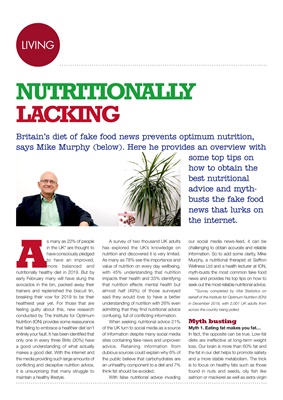
LIVINGLIVING
A
s many as 22% of people
in the UK* are thought to
have consciously pledged
to have an improved,
more balanced and
nutritionally healthy diet in 2019. But by
early February many will have slung the
avocados in the bin, packed away their
trainers and replenished the biscuit tin,
breaking their vow for 2019 to be their
healthiest year yet. For those that are
feeling guilty about this, new research
conducted by The Institute for Optimum
Nutrition (ION) provides some reassurance
that failing to embrace a healthier diet isn't
entirely your fault. It has been identified that
only one in every three Brits (30%) have
a good understanding of what actually
makes a good diet. With the internet and
the media providing such large amounts of
conflicting and deceptive nutrition advice,
it is unsurprising that many struggle to
maintain a healthy lifestyle.
NUTRITIONALLY
LACKING
Britain's diet of fake food news prevents optimum nutrition,
says Mike Murphy (below). Here he provides an overview with
some top tips on
how to obtain the
best nutritional
advice and mythbusts the fake
food
news that lurks on
the internet.
A survey of two thousand UK adults
has explored the UK's knowledge on
nutrition and discovered it is very limited.
As many as 78% see the importance and
value of nutrition on every day wellbeing,
with 45% understanding that nutrition
impacts their health and 33% identifying
that nutrition effects mental health but
almost half (49%) of those surveyed
said they would love to have a better
understanding of nutrition with 26% even
admitting that they find nutritional advice
confusing, full of conflicting information.
When seeking nutritional advice 21%
of the UK turn to social media as a source
of information despite many social media
sites containing fake news and unproven
advice. Retaining information from
dubious sources could explain why 6% of
the public believe that carbohydrates are
an unhealthy component to a diet and 7%
think fat should be avoided.
With false nutritional advice invading
our social media news-feed, it can be
challenging to obtain accurate and reliable
information. So to add some clarity, Mike
Murphy, a nutritional therapist at Saffron
Wellness Ltd and a health lecturer at ION,
myth-busts the most common fake food
news and provides his top tips on how to
seek out the most reliable nutritional advice.
*Survey completed by Vital Statistics on
behalf of the Institute for Optimum Nutrition (ION)
in December 2018, with 2,001 UK adults from
across the country being polled.
Myth busting
Myth 1. Eating fat makes you fat…
In fact, the opposite can be true. Low-fat
diets are ineffective at long-term weight
loss. Our brain is more than 60% fat and
the fat in our diet helps to promote satiety
and a more stable metabolism. The trick
is to focus on healthy fats such as those
found in nuts and seeds, oily fish like
salmon or mackerel as well as extra virgin